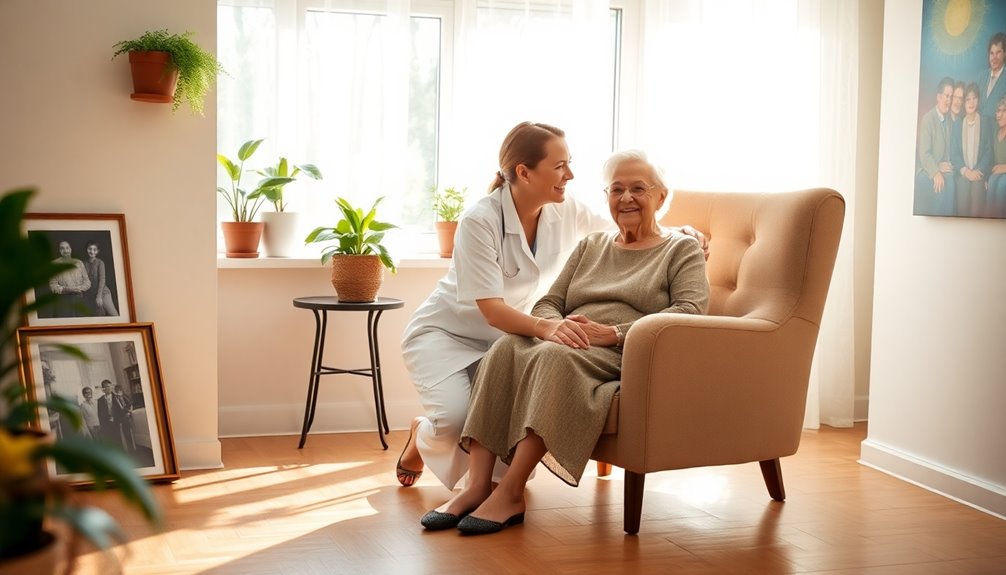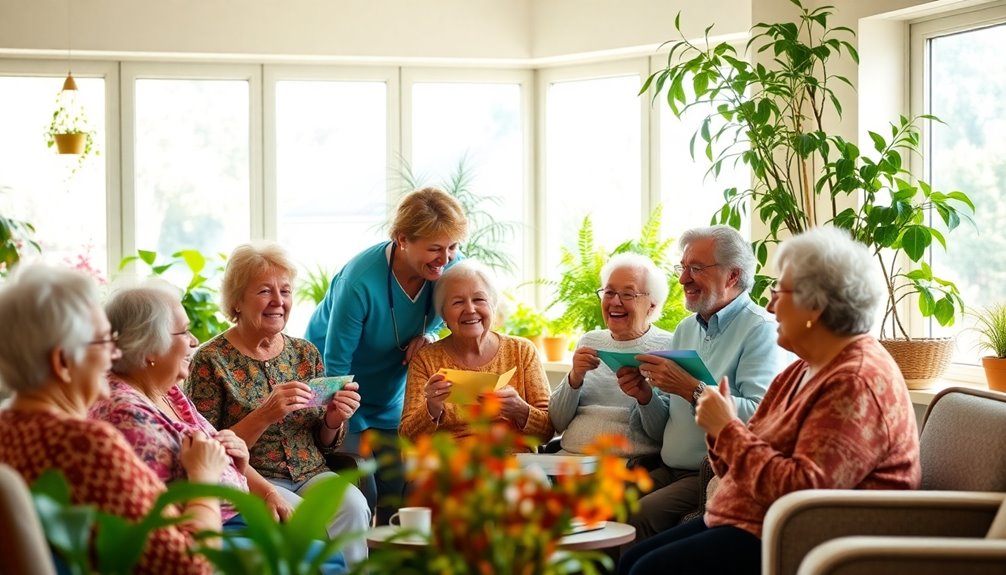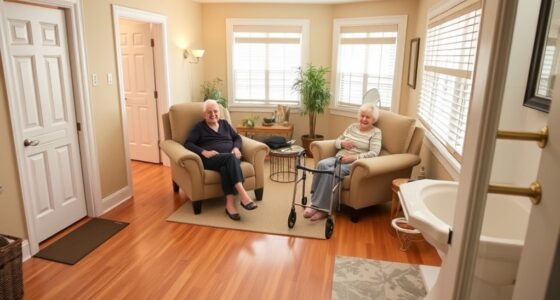To enhance the well-being of seniors, start by evaluating their individual needs for personalized care and establishing open communication. Create a safe living environment with easy access and modifications for independence. Build a support network that includes family, friends, and professionals to guarantee thorough care. Encourage social engagement and maintain personal hygiene with dignity. Prioritize your own self-care as a caregiver. Discover additional compassionate practices that can elevate the quality of care and connection for your loved ones.
Key Takeaways
- Develop individualized care plans that respect the dignity and preferences of elderly individuals, ensuring their unique needs are met.
- Foster open communication through active listening techniques, encouraging seniors to express their feelings and participate in care decisions.
- Implement safety modifications, such as grab bars and adequate lighting, to enhance accessibility and reduce fall risks in their living environment.
- Engage family members and community resources to strengthen support networks and improve emotional well-being for both seniors and caregivers.
- Encourage participation in social and community activities to combat isolation and promote emotional connections and joy in life.
Assessing Individual Needs for Personalized Care

When you assess the individual needs of elderly individuals, you'll begin to create a foundation for personalized care that truly meets their unique requirements.
A compassionate, holistic approach involves evaluating physical health, cognitive abilities, and emotional well-being. By identifying health issues early and understanding the emotional, social, and environmental factors at play, you can develop an individualized care plan that respects their dignity and preferences. Additionally, creating transforming spaces that cater to their physical and emotional needs can significantly enhance their living experience. Implementing financial planning strategies to address potential assisted living expenses can also alleviate stress for both caregivers and the elderly individuals.
This ongoing assessment allows you to adjust the care plan as needed, ensuring it evolves with their changing circumstances. A strong support network enhances their quality of life, helping you address their unique needs effectively. Incorporating personalized care practices can significantly improve their overall well-being and happiness.
Ultimately, your commitment to personalized care fosters a nurturing environment where elderly individuals can thrive.
Establishing Open Lines of Communication

Establishing open lines of communication is essential for providing effective care to elderly individuals, as it guarantees their preferences and concerns are fully understood.
By creating a comfortable space for discussions, you encourage elderly individuals to express their needs, fostering a trusting caregiver-patient relationship. Recognizing patterns of emotional coldness can also be beneficial in enhancing these discussions and ensuring their emotional well-being.
Employing active listening techniques, like paraphrasing and asking open-ended questions, enhances communication and assures they feel heard and valued.
Involving them in care decisions empowers them, reinforcing their sense of control over their lives. Regularly sharing feelings and memories can deepen emotional connections, making it easier to address important care-related topics.
This compassionate caregiving approach not only respects their autonomy but also promotes a more meaningful and respectful interaction. Moreover, understanding the potential link between Parkinson's and dementia can further inform caregivers in their communication strategies and care practices.
Creating a Safe and Accessible Living Environment

Creating a safe and accessible living environment is essential for elderly individuals, as it directly impacts their well-being and independence. Simple modifications can markedly reduce the risk of falls, which account for over 30% of injuries among older adults.
Installing grab bars in bathrooms and ensuring adequate lighting throughout the home enhances both accessibility and safety. You can also use checklists to identify potential hazards, leading to a safer living space.
Incorporating adaptive technologies, like stairlifts and walk-in tubs, provides greater ease of movement. Additionally, implementing medical alert systems and home monitoring devices offers peace of mind for both seniors and caregivers, ensuring prompt assistance in emergencies.
Prioritizing these changes fosters a more secure environment for elderly individuals.
Balancing Independence With Necessary Assistance

Maintaining a safe and accessible living environment sets the foundation for elderly individuals to thrive with a sense of autonomy. Balancing independence with necessary assistance is essential. By utilizing assistive devices, like grab bars and mobility aids, you can promote autonomy while ensuring safety. Engaging elderly individuals in activities that stimulate cognitive development can also enhance their quality of life.
| Personal Care Tasks | Support Tailored to Needs |
|---|---|
| Decision-Making | Regularly assess care plans |
| Respect Dignity | Engage in personal care tasks |
| Overall Well-Being | Encourage participation |
Engaging elderly individuals in decision-making enhances their self-image and overall well-being. Always approach personal care tasks with dignity, allowing them to take part as much as possible, fostering control and independence. Regular evaluations help maintain the right balance of support. Additionally, incorporating assistive devices can significantly improve their daily living activities and overall safety.
Building a Support Network for Comprehensive Care

Building a support network is essential for ensuring thorough care for the elderly. You can strengthen this network by engaging family members, utilizing community resources, and connecting with healthcare professionals. These connections not only improve care quality but also provide emotional support for everyone involved. Additionally, engagement in physical activities can serve as a vital component in enhancing the emotional well-being of caregivers and the elderly alike. Regular participation in mindfulness practices can also help reduce stress and promote mental clarity. Furthermore, maintaining consistent routines can significantly contribute to the stability and comfort of elderly individuals during their care.
Engaging Family Involvement
How can family involvement transform the care of elderly loved ones? Engaging family members not only fosters emotional support but also creates a strong support network that enhances personalized care. When families participate in decision-making about care plans, they guarantee their loved one's needs and preferences are met, promoting autonomy. Regular family meetings encourage open communication, allowing for a collaborative approach that can lead to better overall health outcomes. Additionally, involving family members in the care process can help them stay informed about community resources, ensuring that they can provide the necessary support and assistance to their loved ones. Understanding foster parent pay can also help families connect with local support programs that may be available for their elderly relatives. Seniors texting humor can also serve as a light-hearted way to maintain connections and reduce feelings of isolation within the family.
| Family Involvement | Benefits | Strategies |
|---|---|---|
| Engaging Family Members | Reduces feelings of isolation | Hold regular family meetings |
| Care Plans | Guarantees personalized care | Involve family in decisions |
| Community Resources | Provides additional support | Connect with caregiver support groups |
Utilizing Community Resources
While maneuvering through the complexities of elderly care, tapping into community resources can greatly enhance the support network available to both seniors and their caregivers.
Senior centers offer social activities and wellness programs that foster engagement and connection. For caregivers, support groups and respite care services can alleviate emotional burdens, allowing for much-needed breaks. These support groups can provide invaluable guidance and shared experiences that empower caregivers. Additionally, successful co-parenting strategies can be beneficial for caregivers managing family dynamics.
Volunteer programs can also pair community members with seniors, reducing loneliness and promoting social interaction. Furthermore, local healthcare providers can connect you to essential home health services, such as nursing and therapy.
Collaborating with faith-based organizations can enrich both emotional well-being and spiritual support for everyone involved. By utilizing these resources, you create a thorough care network that benefits both seniors and caregivers alike. Furthermore, incorporating regular decluttering practices can help maintain a clean and organized environment, enhancing overall well-being.
Connecting With Professionals
Establishing a strong connection with healthcare professionals is essential for ensuring that elderly individuals receive extensive and coordinated care tailored to their unique needs.
By connecting with professionals, you can help navigate available resources and address both physical and emotional needs.
Consider these steps:
- Engage with healthcare professionals like doctors and therapists for extensive care.
- Utilize telehealth services to overcome communication barriers, especially for those with mobility challenges.
- Join caregiver support groups to access emotional support and community resources.
These connections foster collaboration, ensuring everyone involved is aligned with the elderly person's preferences.
Managing Medications Effectively

Managing medications effectively is essential for guaranteeing the health and well-being of elderly individuals. By implementing medication management systems like pill organizers and digital reminders, you can help prevent missed doses. Regularly reviewing medications with healthcare providers minimizes the risk of polypharmacy and enhances safety and efficacy.
| Medication Type | Purpose | Side Effects |
|---|---|---|
| Prescription | Treat specific conditions | Varies by medication |
| Over-the-Counter | Symptomatic relief | May include nausea |
| Herbal Supplements | Alternative therapies | Interactions possible |
Establish a consistent home care plan for medication administration and educate families about maintaining an up-to-date list of all medications. This guarantees thorough care coordination and compassionate care for elderly individuals.
Ensuring Personal Hygiene and Comfort

Guaranteeing personal hygiene and comfort for elderly individuals is essential, as it not only prevents skin infections but also enhances their dignity and overall well-being.
Here are three key practices to contemplate:
- Use gentle, fragrance-free cleansers and warm water for a soothing experience that minimizes irritation.
- Implement high-quality absorbent products for incontinence management, maintaining skin integrity and boosting confidence.
- Regular assessments of personal hygiene needs foster autonomy and guarantee that care aligns with their individual comfort levels.
Creating a calm environment during personal care routines helps alleviate anxiety, allowing the elderly to feel secure.
Addressing Loneliness and Promoting Social Engagement

Loneliness can be a heavy burden for older adults, but you can help change that by encouraging participation in community activities.
Joining senior centers or hobby groups not only fosters connections but also adds joy to daily life.
Additionally, embracing digital engagement opportunities allows seniors to stay in touch with family and friends, further enhancing their social circles.
Community Activity Participation
Participating in community activities can greatly enhance your social connections and combat feelings of isolation. Engaging with others not only fosters friendships but also boosts your emotional well-being.
Consider the benefits of joining community activities:
- Reduced Loneliness: Regular social participation lowers feelings of loneliness and isolation, improving your mental health.
- Increased Physical Activity: Many senior centers offer exercise classes that keep you active and promote overall health.
- A Sense of Purpose: Volunteering connects you with others and gives you a reason to engage, leading to increased life satisfaction.
Digital Engagement Opportunities
Digital engagement opportunities can greatly enhance your social life and well-being as you age. By utilizing video calls and social media, you can keep in touch with family and friends, boosting your emotional well-being and reducing feelings of loneliness.
Participating in online community groups allows you to engage with peers who share your interests, promoting social interaction and combating isolation. Digital literacy programs can empower you to navigate technology, helping you engage in virtual activities and maintain connections.
Additionally, telehealth services not only improve access to healthcare but also allow regular contact with providers, further reducing loneliness.
Embracing these opportunities fosters mental engagement and enriches your life, making it easier to stay connected and active.
Respecting Dignity and Personal Choices

Respecting the dignity of elderly individuals is essential, as it acknowledges their unique preferences and choices in daily life.
When you prioritize their needs, you enhance their emotional well-being and sense of autonomy.
Here are three compassionate practices to contemplate:
- Involve them in end-of-life planning discussions to honor their wishes.
- Tailor care based on their personal preferences and unique needs.
- Provide emotional support to alleviate feelings of isolation.
Prioritizing Self-Care as a Caregiver

Although caregiving can be deeply rewarding, it often comes with significant challenges that can take a toll on your well-being.
Prioritizing self-care is vital, as neglecting your needs may lead to a 63% higher risk of burnout, negatively affecting the quality of care you provide.
Regular physical activities like walking or yoga can reduce caregiver stress by up to 30%, boosting your physical health and emotional resilience.
Aim for 7-8 hours of sleep each night to enhance your mood and cognitive function.
Engaging in hobbies and social interactions can improve caregiver satisfaction and alleviate feelings of isolation.
Additionally, utilizing support groups or therapy offers essential coping mechanisms, leading to a 40% decrease in reported caregiver stress, enhancing your overall well-being.
Frequently Asked Questions
What Is Compassionate Care for Older Adults?
Compassionate care for older adults means recognizing their emotional, psychological, and physical needs.
You focus on active listening and engaging genuinely with them, which helps reduce feelings of loneliness and anxiety.
By fostering trust, you create a supportive environment that encourages better treatment adherence and recovery outcomes.
It's all about respecting their unique life experiences, promoting dignity, and ensuring they feel valued, which ultimately enhances their overall well-being and quality of life.
How Do You Show Compassion to the Elderly?
Imagine sitting with a wise elder, their eyes sparkling with untold stories.
You show compassion by actively listening, validating their feelings, and engaging them in conversations about their lives.
Anticipate their needs by noticing subtle changes in behavior, and address those shifts gently.
Create a calming environment to ease any confusion they may feel.
How Would You Promote the Well-Being of an Elderly Person at Home?
To promote the well-being of an elderly person at home, you can encourage social interaction through community activities or visits from family.
Create a personalized care plan that respects their preferences, ensuring routines feel familiar.
Make their living space safe by removing hazards and installing grab bars.
Provide balanced meals tailored to their dietary needs, and maintain open communication, actively listening to their concerns and involving them in decisions about their care.
Why Is It Important to Encourage a Sense of Empathy and Compassion for the Elderly?
Encouraging empathy and compassion for the elderly is essential because it helps you build trust and open communication.
When you understand their unique needs and feelings, you can better support them. Compassionate interactions can reduce their anxiety and loneliness, improving their emotional health.
Plus, fostering empathy creates a positive environment, benefiting both you and the elderly individuals you care for.
Ultimately, it leads to a more fulfilling and enriching experience for everyone involved.
Conclusion
In the tapestry of elderly care, every thread you weave—be it compassion, communication, or respect—strengthens the fabric of well-being. By nurturing individual needs and fostering connections, you create a sanctuary where seniors can thrive. As you balance independence with support, remember that your role is akin to a gardener, tending to each unique flower. Prioritize your own self-care, for only then can you continue to cultivate a vibrant garden of health and happiness for those you love.









